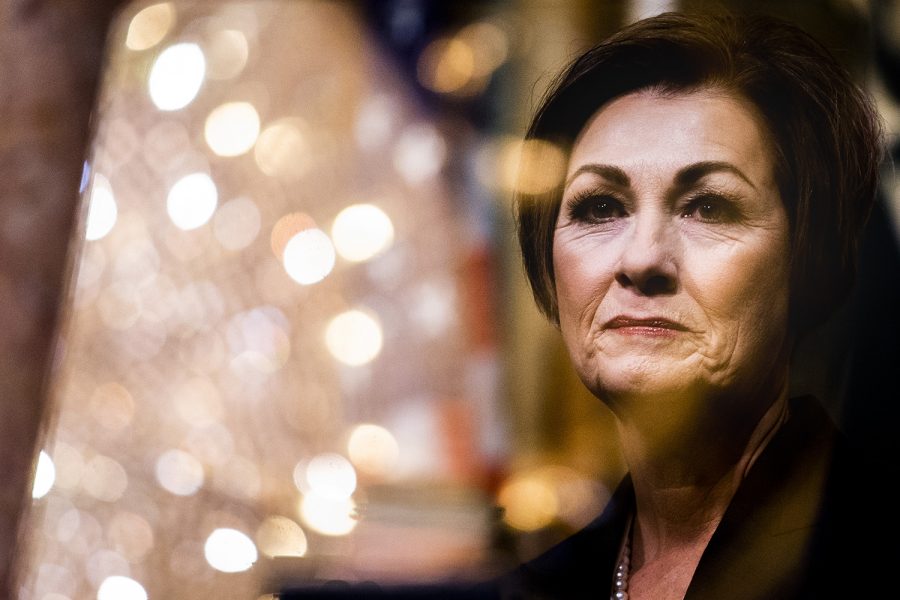Iowa governor says Test Iowa delays due to State Hygienic Lab routine validation process
With a partial reopening of the state on Friday, Reynolds discussed the COVID-19 testing process, when cases will peak, and resuming religious services.
Gov. Kim Reynolds gives the Condition of the State address at the Iowa State Capitol on Tuesday, January 14, 2020. Gov. Kim Reynolds discussed initiatives such as tax cuts, mental health funding, and workforce training.
May 1, 2020
Iowa Gov. Kim Reynolds called the state’s new Test Iowa result delays a “short-term issue” due to the testing equipment from Test Iowa companies going through a validation process by the University of Iowa’s State Hygienic Lab, and the lab experiencing a high volume of tests.
She said there was a backlog of data entry results at the lab, which officials use to report daily new cases, due to the high volume of testing. Reynolds said, however, that Iowans waiting on results will receive their results over the weekend.
“I want to assure Iowans that this is a short-term issue while the lab is transitioning to accommodate not only a higher volume of tests on an ongoing basis, but as they work through the validation of the Test Iowa process,” Reynolds said.
Test Iowa, a partnership between the state and private technology companies Domo, Qualtrics, and NomiHealth, has Iowans take a survey to determine based on symptoms and contact with others whether they qualify for a test. The new initiative is supposed to add 3,000 tests per day to Iowa’s previous testing capacity, and is routed through the State Hygienic Lab in Coralville. Reynolds said Thursday she would route it through the lab as the same partnership in Utah has come under criticism for having a low accuracy rate due to contracting an ill-equipped hospital to conduct the tests.
The initiative has set up testing sites in Des Moines and Waterloo.
First reported by the Des Moines Register, Iowans were experiencing delays longer than 72 hours in getting results back after Reynolds said during an April 21 press conference announcing the initiative that Iowans would receive results within that time frame. On the State Hygienic Lab’s website, a blerb said testing results for any tests may be delayed up to 72 hours for the week of April 27 due to a high volume of testing.
She said the Test Iowa equipment needed to be validated by the State Hygienic Lab similar to how the SHL itself initially needed their COVID-19 testing process validated by the Centers for Disease Control and Prevention when testing first became available. She said because the SHL was certified, the lab could conduct validation for the Test Iowa equipment. According to the lab’s website, external laboratories can be verified to conduct tests by sending five positive and five negative tests to be confirmed by the SHL.
The SHL added shifts to accommodate the high volume of testing before the Test Iowa partnership was announced. Reynolds said during her press conference Friday that the lab was conducting three separate shifts to test around the clock.
Reynolds said that because of the recent deployment of tests to essential workers and locations with high virus activity, the positive case count may be higher than expected when results are released. However, they are hoping to increase the testing capacity in the SHL and hospitals.
Friday is set to be the first day restaurants and other businesses in 77 counties are allowed to reopen at 50 percent capacity.
Despite early predictions that a peak in cases would happen in mid-to-late April, Department of Public Health Deputy Director Sarah Reisetter said she doesn’t expect Iowa has seen the peak. Still, the IHME model from the University of Washington predicts the peak was seen on April 28.
“I’m not going to say that we’ve seen the peak. Testing is still increasing, we are doing surveillance testing, which means we are identifying people who are positive in some of these situations where they might not be experiencing any symptoms,” Reisetter said. “We are going to continue offering support to businesses and long-term care facilities across the state.”
Reisetter provided an overview of the health practices that churches, temples, synagogues, and other religious congregating spaces will need to follow, as limitations on religious gatherings have been lifted across the state Friday.
Places of worship must maintain social distancing of employees and congregants, Reissetter said, while hand washing and sanitizing supplies should be readily available.
“We encourage the continuation of remote audio or video services got high risk Iowans and others who choose to stay home but wish to engage with their religious community. Smaller in-person services or outdoor services can also be considered,” Reissetter said.
Greg Baker, Executive Vice President of The Family Leader, a conservative political-advocacy organization, said that churches are looking to reopen wisely. Most will be continuing with the online services, particularly in the 22 counties that will remain closed, Baker said.
Many places of worship, Baker said, are focusing on helping with many of the needs that have grown during this time such as a PPE and food shortage by making masks and holding food drives.
Sarah Watson contributed to this report.



